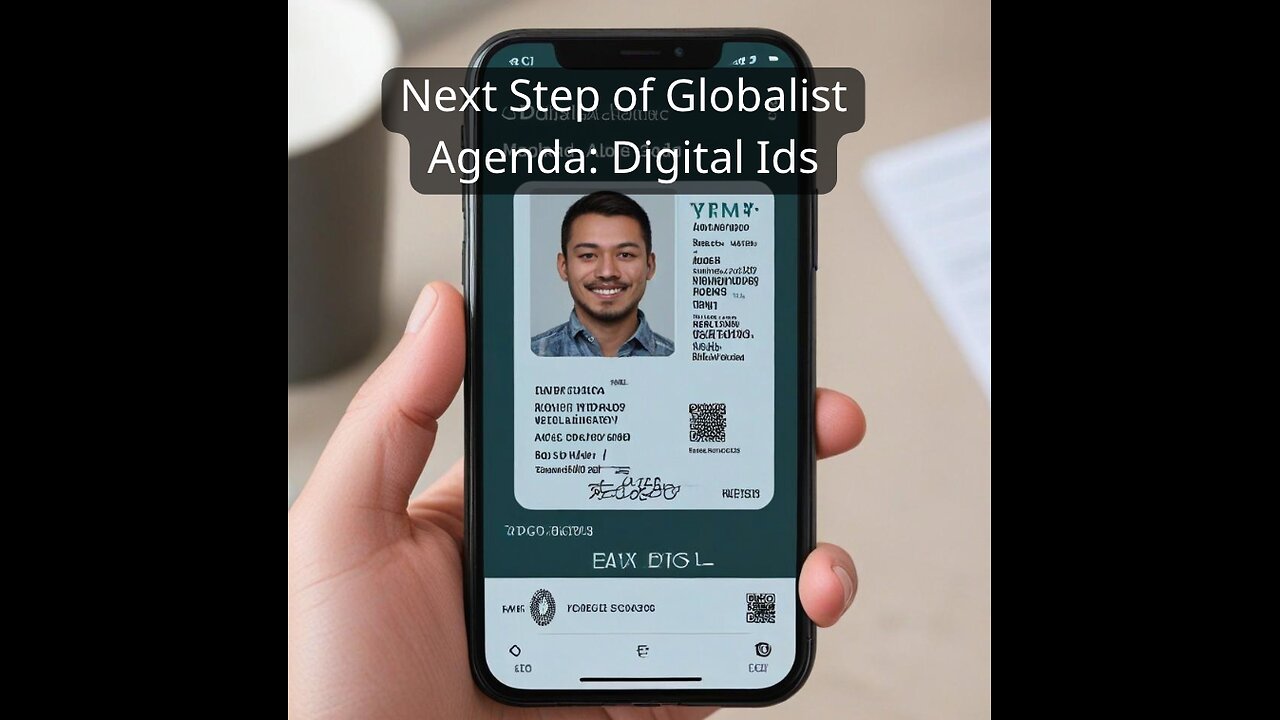Premium Only Content

Digital IDs Are Here: The Hidden Agenda Behind Global Rollout Exposed!
The implementation of digital identification systems is progressing swiftly across numerous nations, spearheaded by influential organizations such as the World Economic Forum, World Health Organization, United Nations, and European Union. These groups have long envisioned the introduction of digital IDs, with the COVID-19 pandemic accelerating their adoption.
Recently, the Australian Parliament passed digital ID legislation, while the American Federal Aviation Administration (FAA) added digital IDs to its list of acceptable identification forms. Additionally, new EU digital ID regulations are set to be enforced starting Monday. A user on X highlighted, "Digital ID Has Officially Been Passed In Australia. This was their ultimate goal with COVID-19. 15-minute cities coming soon." Earlier this month, the Digital ID and Authentication Council of Canada (DIACC) certified its first digital ID verification platform.
The Biden Administration has updated its National Cybersecurity Strategy Implementation Plan to include digital identification via facial recognition biometrics. At least eleven U.S. states now permit digital driver’s licenses, with others, like New Mexico, considering similar measures.
Australian Minister of Finance Katy Gallagher assured citizens on News Breakfast that the new digital IDs will not be mandatory and will not be used for tracking purposes. However, Wide Awake Media expressed skepticism on X, stating, “The EXACT same people who assured you the mRNA injections would be voluntary (and were ‘safe and effective’), are now assuring you digital ID will be voluntary, and won’t be used for any sinister purposes by the government. They are lying to you again.”
Despite these assurances, there is a growing belief that governments may eventually mandate these IDs. India has been a significant testing ground for biometric surveillance, with figures like Bill Gates praising the country for its digital public infrastructure monitored by the World Bank. The United Nations Development Program's (UNDP) “50-in-5” campaign, launched last year, has been using 50 developing countries to test digital IDs. This approach often sees new measures trialed in the developing world before being implemented more broadly.
Australian Senator Malcolm Roberts has vocally criticized the digital ID rollout, warning of its implications and the potential for government overreach. As these systems continue to develop, concerns about privacy and control remain central to public debate.
-
 3:59
3:59
Conspiracy Chronicle
7 months agoRadioactive Shipment Disappears in New Jersey—Are Drones on the Hunt?
2081 -
 27:35
27:35
NordicVentures
7 days ago $1.23 earned3 Days Solo on a Island: How to Build a Simple Beach Shelter!
12.1K5 -
![LIVE Replay - Back from the Beginning! [Elden Ring]](https://1a-1791.com/video/fww1/3e/s8/1/W/K/Z/3/WKZ3y.0kob.1-small-Back-from-the-Beginning-Eld.jpg) 2:06:54
2:06:54
JTtheSG
2 hours agoLIVE Replay - Back from the Beginning! [Elden Ring]
8.09K -
 LIVE
LIVE
Barneyjack
2 hours agoWarframe LR$/MR34 Game and Giveaways!! Get in here :) :)
102 watching -
 1:46:49
1:46:49
Survival Dispatch
6 days agoThe REAL Truth About Media's Terrorism Coverage vs Reality EP534
17.8K5 -
 2:21:28
2:21:28
Pepkilla
3 hours agoCall of Duty Warzone ~ BOT RUNNING
5.24K -
 1:05:12
1:05:12
Greg Hunter's USAWatchdog.com
22 hours ago100% Chance of Nuclear War – Martin Armstrong
65K53 -
 2:21:13
2:21:13
Tundra Tactical
18 hours ago $9.40 earned"The World's Okayest Gun Live Stream: Reloading Series Announcement & ATF Pistol Brace is Dead
51.1K3 -
 45:12
45:12
TheCommonSenseShow
2 days agoCONTRIBUTE AND PROFIT FROM THE NEW DOMINANT MEDIA- SAM ANTHONY
7.18K -
 1:23:15
1:23:15
Sports Wars
5 hours agoWNBA Players EMBARRASS Themselves At All Star Game, UFC 318, MLB All Star Game Heroics
29.7K9